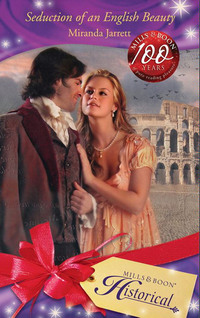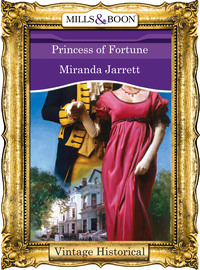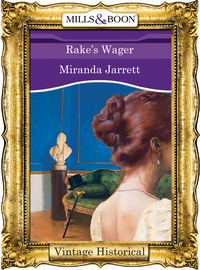
Полная версия
The Adventurous Bride
“Like a highwayman you are, my lord, come to steal from a poor old man.” With a great effort, Dumont dislodged himself from the high-backed chair behind the counter. “Why won’t you leave me in peace, eh?”
“Because once in a great while, Dumont, I find a treasure here in your rubbish heap,” John said, unperturbed by the old man’s comments. He had been away from London for over a year now, and was at last planning to return to London later this week. He needed a small gift to take to the opulent Duchess of Cumberland, a most loyal friend. His dalliance with Her Grace had begun last winter in Rome, and ended there, too, quite amicably for both parties. But still John believed a little token, something for her new house in Grosvenor Square, would make a pretty gesture. Her Grace had already promised him her support when he finally returned to London; God only knew that he’d need such powerful allies after last year’s disastrous scandal on the beach at Brighton. Besides, he liked to leave ladies sighing fondly after him; such thoughtfulness had always served him well.
“‘My rubbish heap’. Oh, you’re cruel, my lord, too cruel.” With another groan, Dumont shuffled forward, his arms cocked at the elbows and his hands folded loosely over his leather apron like an elderly squirrel. “But I’ve serveral new pieces, yes. One collector’s misfortune is another’s bounty, my lord, and so it shall always be.”
“I trust it’s no gentleman of my acquaintance,” he said, purposefully bland and disinterested. Paintings and other art were often the first things to be sold when a gentleman suffered a financial reversal. Depending on the circumstances, John might well be able to turn this to his own advantage, and resell the art in London for a profit.
He’d offer no excuses for it, either. Younger sons didn’t have to, particularly youngest sons who’d had the misfortune to be born sixth in line to an Irish peerage with a bankrupt estate. Oh, he’d a miniscule income from a distant uncle and tolerable luck at the gaming tables, and by necessity and inclination he’d mastered the arts of friendship and favors from his wealthier fellows—and from ladies, too, on occasion. But if John’s life had given him a rocky path to climb, so be it. He’d simply seen the rough diamonds scattered among the stones and gathered them up, and where, really, was the sin in that?
“I’ve many sources of supply, many sources,” Dumont was saying vaguely. “You can scarce expect a man of my age to recall them all. Are you here today with a specific purchase in mind, my lord? Might I guide you to your selection?”
“I’ll keep my own eyes open for what pleases me.” John could be vague, too; it was another of his talents. He let his gaze wander the shelves crowded with bits of ornamental glass and porcelain, statues and carvings, paintings and sketches. The Duchess of Cumberland wasn’t choosy about quality, but she did demand that her possessions—and her gifts—reflect the grandeur of both her person and her station. Anything gilded would do, or a Venus, or even a fat little Cupid might—
“Here you are, my lord.” Dumont was proudly displaying a small bronze statue of Mercury. “From the very hands of that great master Benvenuto Cellini himself. You can tell by the delicacy of the work, the exuberance of the line, each the mark of true sixteenth-century genius!”
The shopkeeper handed the bronze to John, then pressed his plump, white palms together as if in prayer, his voice hushed with reverence as he hovered at John’s side.
John carried the little statue to the shop’s bow window and tipped it toward the weak sunlight. It was a respectable forgery, the patina nicely burnished to mimic age. But the Mercury’s expression was simpering and cross-eyed, and if he ever straightened the leg that was bent in flight, one winged foot would likely dangle down a good two inches below its mate.
Dumont inched closer, misreading John’s silence. “You are in awe, my lord, as is proper, yes? To be able to cradle such genius in your hands is a gift, a blessing, an honor, a—”
“A cheat,” John said mildly. “You know as well as I that this sorry little rascal’s lucky if he’s three years old, let alone three hundred.”
Dumont’s eyes popped wide with wounded indignation, his white brows bristling upward. “No, my lord, no! I had it on the very best advice that this bronze is authentique! That you would accuse me of such delusion, such—”
“I’m not accusing you of anything, Dumont,” John said. “Nor am I telling you anything that you don’t already know.”
“But my lord, I cannot see how—”
The brass bell over the door jingled. Instantly Dumont turned toward it, grateful for the interruption. John looked, too.
And smiled.
How could he not? The girl was young and lovely, her beauty radiant enough to glow with its own light in the dismal shop. She was undeniably English, and likely wealthy, too. There were good-sized pearls hanging from her ears, and gold beads around her throat and over the wrists of her kidskin gloves. Her petticoat and jacket were costly but outdated, printed with oversized tulips that would make a fashionable Parisian shudder, tulips that contrasted garishly with the girl’s creamy English complexion and dark chestnut hair. No more than twenty: a small, neat waist, high, rounded breasts, trim ankles and a pretty foot.
He appraised her quickly, efficiently, as he had the bronze Mercury. But what made him smile was how briskly she snapped her beribboned parasol shut, how she sailed into the little shop with her back straight and her head high and a guardian footman trailing after in her wake, as ready to conquer this foreign place as any admiral.
Dumont coughed delicately, and patted the sides of his grizzled wig. “If you pray excuse me, my lord, I must greet the lady.”
“Of course you must, you old rogue.” John slipped the bronze Mercury more comfortably into the crook of his arm, content to watch this little scene unfold from the curving recess of the bow window. “Go on, go on. How could you resist such a pretty pigeon waiting to be plucked?”
But Dumont was already with the girl, bowing and scraping as if she were the queen.
“Good day, mademoiselle,” he said in English, as quick as John had been to recognize her nationality. “Allow me to welcome you to my humble little shop. I place myself and my establishment at your complete disposal.”
She nodded with her stern small chin, already looking away from Dumont to the crowded shelves and walls behind him. “I should like to see whatever quality paintings you have in your stock.”
“Be assured that every painting I have is of quality, mademoiselle.” Dumont puffed out his narrow chest with unfounded pride. “I would not have it otherwise.”
“Show your respect,” the footman ordered sternly. “Her ladyship’s not one o’ your common mam’selles. She’s Lady Mary Farren, daughter of His Grace the Duke o’ Aston.”
The girl wrinkled her nose. “Oh, please, Winters, that’s not necessary. The man doesn’t care who I am.”
But Dumont cared very much, and John could practically see the newly raised prices bobbing over the Frenchman’s head. The daughter of an English duke was indeed a rare little pigeon to find in a grimy old port like Calais.
And though the daughter of a duke, the wife of no husband. Interesting, thought John idly. Why wasn’t she in London, pursuing a suitable mate the way every other girl of her age and bloodlines would be? She was certainly fair enough, and there was undoubtedly money for a dower. Was there some sort of fascinating scandal that had washed her up on these shores?
Very interesting. Perhaps she could be persuaded to help amuse him until he sailed….
“Oh, my lady, forgive my ignorance of your great station!” the shopkeeper cried. “To be honored by your presence, your custom! How dare you believe I wouldn’t care!”
“Well, yes, thank you,” Lady Mary said, obviously unimpressed. “Now, if I might see your paintings.”
John smiled again. He liked a direct woman, one who didn’t need a lot of long-winded flattery.
“Mais oui, my lady.” With another bow, Dumont ushered her along the wall, passing several grim-faced portraits to stop before a pastoral landscape with a pair of pipe-playing satyrs, prancing through the flowers on their goatish legs. “Now this is a picture of the first order, my lady. The school of Claude, if not by the master himself.”
The girl didn’t answer, bending down to study the painting’s surface more closely, her brows drawn into a skeptical frown.
Undaunted, Dumont plunged ahead. “The brushwork is superb, is it not, my lady? I sold a picture much like this—though not half so fine—to an English gentleman last week, and delighted he was to procure it for his estate.”
“I should not,” she said, stepping back. “Be delighted to possess such a picture, that is. Who would wish to look at those dreadful satyrs every day over tea?”
“Ahh, so her ladyship has a certain taste,” Dumont murmured, wincing. “A refined taste, that is.”
“What I have a taste for is quality, sir,” the girl said with thumping conviction. “It’s not the satyrs themselves that I dislike, but how clumsily they’re painted. You slander Claude, sir, by claiming this daub’s by him.”
“The school of Claude, my lady, the school,” Dumont said hastily, moving to a morose still life painting of wilted flowers and rotting fruit. “Perhaps you would prefer a more edifying picture, my lady, a reminder of our own mortality and a caution against the consequences of a worldly life.”
“A lady should have no need of such reminders, sir,” she said. “But this picture here—this one I quite like.”
Gracefully the girl stepped around Dumont and crouched down before a small painting propped against the wall. She tipped the heavy gold frame back with her gloved fingers and smiled with triumph.
Dumont frowned. “That one, my lady? Oh, I fear not, I fear not!”
John’s curiosity rose. From his place by the window, he couldn’t see the little painting behind the sweep of the girl’s pale linen skirts. What kind of eye did the girl have? Was she taken by a simpering shepherdess or droop-eared puppy the way most young English ladies would be, or had she discovered something with true merit?
Still crouching with her hand on the frame, Lady Mary looked up at Dumont, her face full of disbelief. “However could you fear a painting such as this one? It’s fine, most wonderfully fine, and not at all fearsome. Why didn’t you show it to me first?”
To John’s surprise, Dumont scowled, his wizened hands now folded defensively over his chest. “It’s new to the shop, my lady, and since I believe in honesty with my customers, I must confess that I know nothing of its painter nor its history. Without that knowledge, I cannot in good faith sell such a picture to you.”
“You cannot sell it to me, sir?” She narrowed her eyes, shrewdly calculating the challenge by tipping her head to one side so the pearl earring bobbed against her cheek. “Cannot, or will not?”
“Whichever pleases you to believe, my lady.” Dumont grabbed the painting from Lady Mary, and shoved it behind the counter, out of her reach. “But I regret that I must remain firm. The picture is not for sale.”
And that, at last, was enough for John.
“Dumont, Dumont, what’s come over you?” he said, stepping forward from the window’s curve. “You know better than to deny a lady’s request like that. I assure you, my lady, his manners are generally more agreeable than that.”
She straightened at once, clasping her hands tightly together around the handle of her parasol. “Forgive me, sir, but I do not believe I know you.”
Dumont sighed, and made a testy wave of his hand. “My Lady Mary, my Lord John Fitzgerald.”
“My lady, I am honored.” With the Mercury still cradled in one arm like an unappealling infant, John made a graceful bow. “And I am at your service, willing to be your champion against this dragon.”
Dumont the dragon snorted, with disgust, not fire.
Nor was Lady Mary amused.
“My lord.” Her expression was frosty, with no smile to spare for John. “I do not recall asking for a champion.”
“You didn’t need to,” he said as winningly as he could, doing his best to disarm her. He was unaccustomed to women rebuffing him like this. He knew he was a well-made man, only twenty-nine, and handsome enough to make most females smile back when he smiled first. He wasn’t exactly vain about his appearance, but he had come to expect a certain response to his charm, and it felt odd now not to receive it from Lady Mary. Perhaps she was more trouble than she was worth, a challenge he’d be wiser to turn away from now.
But not quite yet. “Come, come, Dumont. Let me see this picture, and—”
“I’m perfectly capable of conducting this transaction myself, Lord John,” she interrupted, her cheeks flushing. “I would not have ventured into this shop myself if I couldn’t.”
“It’s hardly a question of incapability, my lady.” John set the Mercury down on the counter beside him with a thump. “I only thought you might need a bit of assistance in your negotiations with Monsieur Dumont.”
“I need nothing of the sort,” she said tartly. “If I can manage the affairs of my father’s household and estates, then surely I have the ability to choose a picture to my liking.”
How the devil had he ruffled her feathers so badly? He let his smile fade, and tried a different tactic. “Then it’s no wonder your father has showed his confidence in you by letting you come to the shops by yourself.”
She gave a small, restless twist to her shoulders. “My father trusts me so much that he has sent me abroad while he remains in England. He has no doubts about my capability.”
“You are traveling alone?” John asked, so surprised he was almost stunned. Usually young English ladies on the Continent were so burdened with parents and chaperones and elderly maiden aunts that it was a marvel they managed to see any sights at all. “You are here by yourself in Calais?”
“Here now, m’ lord, none o’ those questions,” the footman warned, moving between John and Lady Mary. He was formidable, a large country specimen, and John was disinclined to quarrel with him. “Her ladyship don’t have to answer them.”
But with an impatient quick sigh, the girl ducked around the footman to confront John once again.
“I am traveling with my sister and our companion, and several servants,” she said, her dark eyes wide and earnest. “So you see that ‘by alone’ I meant without Father.”
John knew otherwise. Without her father or any other male relative, she was as good—and as vulnerable—as travelling alone. The only difference lay in the words, and what she chose to believe, the pretty, parsing creature.
Perhaps she was not so great a challenge after all.
“And as you travel, you’re collecting art,” he said. “With your father’s trust, of course. But do you consider yourself a connoisseur, Lady Mary, or merely a dilettante?”
Doubt flooded her face, exactly as he’d intended. “I’m not certain I’m either.”
John smiled, his suspicions confirmed. Of course the foreign words would be unfamiliar to her; likely she was as willfully ignorant as every other English lady, and couldn’t tell a bonjour from a buongiorno.
“Ah, well, no matter,” he said expansively. “It was unfair of me to ask.”
“I’m perfectly aware of my own ignorance, Lord Fitzgerald,” she said, bristling at the condescension that he hadn’t quite bothered to keep from his voice. “My father has always been afraid I’d become too educated and unattractive to gentlemen, so what I do know has been slipped to me on the sly by Miss Wood, like sweets stolen from the kitchen.”
“Forgive me, Lady Mary,” he began, thankful that she wouldn’t realize how easy it was for his wicked old mind to jump from stolen sweets to lost innocence. “I didn’t intend—”
“I rather think you did,” she insisted. “Don’t pretend otherwise.”
“I’m not pretending,” he protested, though even he knew he was. “I’m being perfectly honest.”
“Oh, yes, as honest as Monsieur Dumont.” She tapped her gloved fingers on the counter, a muted little thump of vindication. “So you see, Lord Fitzgerald, that while I do possess the interest to become a dilettante, I’ve too imperfect a store of knowledge to reinforce that interest, and as for being a connoisseur—why, until I’ve visited the galleries in Paris and Rome and seen the works of the great masters with my own eyes, I could scarce pretend to be a connoisseur.”
“No,” admitted John. She’d just beaten him at his own game, but he liked her for it—liked her far more, in fact, than when she’d been merely another pretty young lady with skin like sweet country cream. “Not under the circumstances.”
“Indeed not,” she said, and at last she smiled. “All I am at present is a humble small collector, buying pictures that please me, rather than those of value or significance. Which is why I want this one so vastly much.”
“You’ll have it.” He wanted to make her smile at him again. Her teeth were small and white, with the front two overlapping a fraction with intriguing imperfection. “Dumont, the picture.”
But the Frenchman only shook his head as doggedly as before, his jowls trembling. “I regret to tell you the same, too, my lord. I cannot sell that painting, not to the lady nor to you.”
“At least you can let me see what you’re hiding.” In one swift motion, John leaned over the counter and seized the painting by the frame.
“No, no, my lord, I beg you, please!” cried Dumont frantically as John held the picture high out of his reach. “It is not for you!”
“Mind you, my lord, I saw it first!” The girl hurried to John’s side, hovering as if she feared he’d try to escape with the picture. “I’m willing to pay whatever he wants!”
“Of course you are.” John turned the frame toward the window’s light. For the first time he could see the painted image, and the sight was enough to make him whistle low with appreciation. This was no common forgery, no piecework daub made up to sell to some ignoramus on his Grand Tour, nor was it the sentimental tripe John had expected the girl to choose.
The picture was undeniably old, at least three hundred years, and painted on a wood panel instead of framed canvas. Italian, most likely Florentine; no Northern artists painted like this. The angel was kneeling, the feathers of his multicolored wings fanned over his back and a sword of orange flames in his hands. His halo was thick with gold leaf, his rainment the particular brilliant blue that came only from ground lapis. But the angel’s face was the real jewel, his expression fiercely intense—a militant guardian angel.
“Isn’t it beautiful?” Lady Mary said, leaning closer to see the picture over John’s arm. “It’s been cut down quite shamefully from something bigger, of course, perhaps an altarpiece, and the frame may be newer.”
John raised one brow with surprise. “Would you venture its provenance?”
She was too intent upon the painting itself to realize she was being tested. “Florentine for certain, from the 1400s. The paint’s that odd eggy stuff, tempera, not oils—you can tell by how smooth it is, without any brushstrokes. Perhaps a Giotto, or a work from the studio of Fra Angelico, if not by the master’s very brush.”
“Most Englishmen would prefer the later work of Guido, or Titian. They’d find earlier paintings like this one too crude.”
She raised her chin: determined, not stubborn. “Then most Englishmen are fools who cannot see the merits of what’s set before them.”
An admirable answer, thought John. “How do you know it’s not a fake?”
Her gaze slid from the painting to John. “I don’t,” she admitted reluctantly. “It could have been made last week by some artful criminal, and I’d be none the wiser. All I know is what I’ve read, and the engravings I’ve seen in books, and a handful of old Italian paintings that a neighbor of ours had brought back from his Grand Tour. That’s how I know the difference between tempera paints and oil.”
“That’s all?” he asked, surprised again. If that truly was the sum of her scholarship, then she’d guessed very well indeed. “Only what you’ve learned from books and your neighbor’s souvenirs?”
She nodded, and smiled wistfully, a small smile that didn’t show her teeth. “Likely you’ll laugh at me for admitting this, but I know what the painting itself tells me, too. The colors, and the angel’s expression, even the patterning along the hem of his raiment and across his wings—it all seemed so magical that I feel certain it’s real. How could anyone make a forgery of that?”
John didn’t laugh. How could he, when she looked up at him with such honesty and conviction from beneath those thick, sooty black lashes?
“So much for pleading beginner’s ignorance, my lady,” he said softly. “A painting only speaks to a connoisseur’s ear, and despite your inexperience, you already had the wisdom to listen.”
“There now, my lord, you see why I cannot sell this picture!” Dumont made another futile grab at the painting, still well beyond his reach. “Even this young lady recognizes its value, its significance!”
“What this lady recognizes, sir, is that the picture is mine,” she said with fresh determination. “Or it will be, as soon as we settle on a price.”
“Name it, Dumont,” John said. “I’ll pay whatever you ask and make a gift of the picture to the lady.”
She gasped, her eyes indignantly round. “I’ve no intention of accepting such a gift from you, Lord John! I mean to buy the picture myself, honorably and respectably!”
“We can quarrel over that once Dumont’s set the price.” Purposefully John frowned down at the Frenchman, hoping to intimidate him into compliance. He was sure that Dumont had mentally ticked the asking price higher and higher with each attribute that Lady Mary had described, and it was up to John to tick it back down again. “Be as honest as you claim, Dumont. You know you’d have the devil of a time selling this painting. Most of your customers will think it’s ugly as sin.”
“It’s not ugly!” protested the girl. “It’s—”
“It’s unfashionable, Dumont, and you know it,” John said firmly, ignoring the girl for now. “Her ladyship is simply being an enthusiastic amateur, and you know that, too. I’ll give you ten livres for it.”
Dumont scowled back. “Why won’t you believe me, my lord? The picture’s not for sale.”
John sighed wearily. He was already offering more than the picture was worth, yet for some incomprehensible reason it had become very important to him to buy it for the girl. “Very well, then, Dumont. Eleven livres, and that’s being deuced generous.”
Still Dumont scowled. “I am very sorry, my lord, but I fear I cannot accept.”
“You’re a stubborn old wretch, Dumont.” John glanced back down at the painting. The girl was right; the angel was magical. “I’ll give you twelve livres and not a sou more.”
Dumont groaned and bowed his head. “My lord, my lord, I regret it to the bottom of my heart, but I cannot—”
“I’ll give you twenty louis d’or for the picture, monsieur.” The girl had already pulled a fat little purse from the pocket in her skirts and was beginning to count out the heavy gold coins in a row upon the counter. “That should be more than sufficient. Winters, take the picture from his lordship. We’ll take it with us back to the inn to make sure it’s safe.”
The footman reached for the painting as he’d been ordered, but John pulled it away. “Here now, Dumont! What’s become of all your reasons not to sell to me?”
“The lady’s overcome my scruples, my lord,” he said sadly, as if there’d ever been a doubt that his greed would triumph. He took the coins as fast as Lady Mary offered them, sliding them into the inside of his black serge waistcoat. “I’m honored and delighted to concede that the picture is now hers.”
“If you please, m’lord.” Lady Mary’s footman reached out for the picture, and this time John had no choice but to relinquish it. The girl had already hidden the purse back in her pocket, while Dumont had produced a grubby old coverlet, which he and the footman began tying around the painting.





